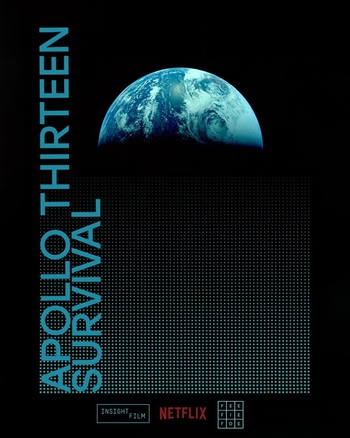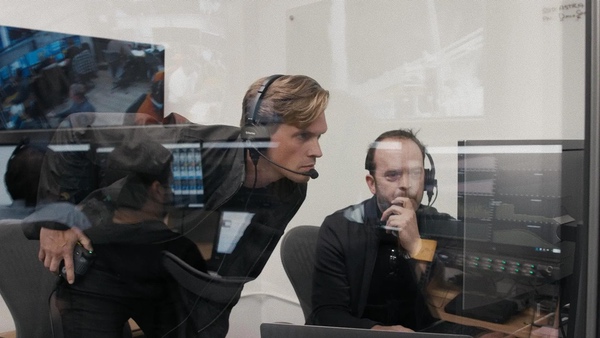 |
Reviews: space documentaries of the past and present
by Jeff Foust
Monday, June 17, 2024

Apollo 13: Survival
directed by Peter Middleton
2024, 96 mins.
Wild Wild Space
directed by Ross Kauffman
2024, 93 mins.
The DC/DOX documentary film festival, held over the weekend in Washington, included two films on space topics. The subjects and filmmaking approaches are very different, but the two perhaps have more similarities than one might think.
| The film manages a dramatic pacing of events through the mission, even though the viewer knows the ultimate outcome. |
On Saturday afternoon, the National Archives hosted the US premiere of Apollo 13: Survival, a documentary about the Apollo 13 mission. The movie relies on archival footage—from NASA, television networks, and even the family of astronaut Jim Lovell—to retell the story of the one of the most famous missions in the history of spaceflight. Its approach draws parallels to 2019’s Apollo 11, which also relied on archival footage and eschewed the use of narration or interviews (see “Review: Apollo 11”, The Space Review, March 4, 2019).
Both documentaries faced a similar challenge of retelling the story of a mission most people were already familiar with The makers of Apollo 13: Survival faced an additional challenge: many people were familiar with Apollo 13 because they had seen the movie of the same name, directed by Ron Howard and starring Tom Hanks. Could reality match up to a dramatic retelling of reality?
Fortunately, the answer was yes. The film manages a dramatic pacing of events through the mission, even though the viewer knows the ultimate outcome, from the service module explosion enroute to the Moon to the various efforts to keep the crew alive and bring them back to Earth. The climax of the film is the capsule’s reentry, building up dramatic tension as the seconds tick by waiting for the crew to restore communications after the radio blackout, even as you know that the radio will come to life—eventually.
The film uses footage that, at the very least, has been rarely used, if at all. There is also audio that is similarly obscure or novel: astronaut Tom Stafford calling Vice President Agnew to provide an update on the situation with the spacecraft, or Ken Mattingly calling Marilyn Lovell to tell her what was going on. On the other hand, the film gives less attention to other, better-known aspects of the mission: the effort to develop an adapter for the carbon dioxide scrubber cartridges, highlighted in the Ron Howard movie, is included only briefly in this documentary, as the crew follows instructions radioed from mission control on how to construct the adapter.
Of the three astronauts on Apollo 13, the film focuses more on Lovell, the commander, than Fred Haise or Jack Swigert, following his family closely before and during the mission. That was in part because of the cooperation provided by the Lovell family, which provided family films that were incorporated into the documentary.
“I saw family videos, and the emotion of my mom was very emotional to watch, to be honest with you,” said Susan Lovell, one of Jim Lovell’s daughters, during an on-stage interview after the screening. She said the filmmakers contacted her and her father in early 2021, seeking both permission to create the documentary as well as to access family archives.
That interview ultimately led to a comparison of the documentary with the movie Apollo 13. “I think the movie Apollo 13 personally was extremely well done,” she said. “It followed the true events of what really happened on that flight.”
But, she said, the 1995 movie took some artistic license. “You had to have some of that in there in order to keep the audience’s attention,” she said. One example she gave was a line in the movie attributed to Jim Lovell’s mother: “If they could get a washing machine to fly, my Jimmy could land it.”
The documentary Apollo 13: Survival, though, shows you can keep the audience interested without the dramatic license of invented quips.
 A still from Wild Wild Space featuring Astra CEO Chris Kemp (left). A still from Wild Wild Space featuring Astra CEO Chris Kemp (left). |
A few hours later, and a few blocks away, the E Street Cinema hosted the world premiere of Wild Wild Space. The documentary is based on Ashlee Vance’s book When the Heavens Went on Sale, which profiled several space startups seeking to find their place in a space economy opened up by the success of SpaceX (see “Review: When the Heavens Went on Sale”, The Space Review, May 15, 2023).
| “There’s not many people that in my experience would have the courage to do something like that,” Vance said of the access Astra’s Chris Kemp provided to filmmakers. |
Three of the companies profiled in Vance’s book make it to the screen: Astra, Planet, and Rocket Lab. The three are interconnected, with Planet buying launch services from the two rival rocket companies; Chris Kemp worked as a consultant for Planet to study potential launch companies, including Rocket Lab, before going on to start Astra. Both Astra and Planet’s founders worked for Pete Worden when he ran NASA’s Ames Research Center and turned it into a hotbed for innovation. (Worden is among those beyond the company founders interviewed in the documentary.)
The triumphs and tribulations of those companies are probably familiar to most readers, whether or not they have read the book, but the film is compelling nonetheless. Part of it is the footage in the movie, taken behind the scenes at some of the companies as they developed their spacecraft and launch vehicles. We see Peter Beck cheering on his young company’s first suborbital rocket launch, one that, had it failed, may have meant the end of Rocket Lab. There is a lot of footage inside Astra as the company struggled to get its rockets flying, including one launch where the vehicle fell back to earth, exploding next to the pad.
Another part of the film’s success is highlighting the personalities of those involved. Kemp and Beck were interviewed for the movie, as well as Planet co-founders Robbie Schingler and Will Marshall. The contrasts in personalities between, for example, Beck and Kemp, extend to their companies and their approaches to doing business.
Kemp is perhaps the closest to a central character in the documentary, tracing his arc from computer nerd to confident (or overconfident) rocket company CEO. “Chris is a very generous and brave person,” Vance, who was a producer of the movie, said in an on-stage interview after the screening, noting that Kemp gave him and the filmmakers extensive access. “There’s not many people that in my experience would have the courage to do something like that.”
The companies featured in Wild Wild Space have gone in different directions. Planet is now operating a constellation of imaging satellites while working on a new generation, and Rocket Lab is preparing for its 50th Electron launch as soon as this week as it develops the larger Neutron rocket. Astra, though, has not launched since a failure two years ago and had flirted with bankruptcy in recent months as it struggled to stay alive. (Firefly, the fourth company profiled in Vance’s book, isn’t included in the movie; director Ross Kauffman said after the screening that he decided to focus on the other three because of their connections with each other and with Worden.)
The film doesn’t shy away from those problems or other issues facing the industry, like concerns about space debris or a loss of privacy from fleets of commercial imaging satellites. However, the movie is neither a warning of the dangers of commercial space nor an uncritical celebration of space entrepreneurship.
| Some of the loudest cheers during the film, for example, came when spaceflight expert Jonathan McDowell, of Jonathan’s Space Report fame, appeared as one of the outside experts interviewed. |
Apollo 13: Survival and Wild Wild Space are on different topics, but share some similarities in approach, like the use of news clips to provide background and connective tissue, stitching together scenes and themes. Another similarity is how they will be distributed, via streaming platforms. Apollo 13: Survival is scheduled to be released on Netflix in September, while Wild Wild Space will appear on HBO Max next month. That makes their screenings Saturday in theaters something of an anomaly.
It was for Wild Wild Space in particular a fortunate anomaly. The screening attracted a crowd of space industry insiders and enthusiasts, who laughed and cheered with greater enthusiasm than a typical audience. Some of the loudest cheers during the film, for example, came when spaceflight expert Jonathan McDowell, of Jonathan’s Space Report fame, appeared as one of the outside experts interviewed.
Among those in the audience were Planet’s Marshall and Schingler and even Astra’s Kemp. At the end of the post-screening interview, Kemp sounded as confident as ever about the future of Astra despite its serious struggles, mentioning how he had raised “a ton of money” as part of a deal to take the company private. “The team is super excited to, as a private company, just put our heads down, get focused on putting Rocket 4 back on the pad.” Rocket 4 is the company’s new, larger launch vehicle whose development had stalled during Astra’s financial problems. “Hopefully that will be much more successful.”
It may, at the very least, be fodder for any sequel to Wild Wild Space.
Jeff Foust (jeff@thespacereview.com) is the editor and publisher of The Space Review, and a senior staff writer with SpaceNews. He also operates the Spacetoday.net web site. Views and opinions expressed in this article are those of the author alone.